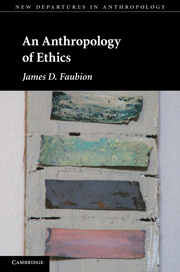3 - Ethical others
Published online by Cambridge University Press: 05 June 2012
Summary
Justness and the other
The elaboration of the dimensions of the mode of ethical subjectivation just completed has one of its primary motivations in the recognition that ethical discourse and ethical practice are intersubjective and that both require the services of another, and especially of the other in the specific guise of the agent of socialization, the ethical pedagogue. The other in less qualified guise – the ethical subject tout court – remains in need of further attention. Such an other is the second party, the addressee, of the Greek virtue of dikaiosunê, “justness” or “justice.”
The term dikaiosunê is an abstraction of the earlier attested dikê, whom Hesiod personifies as a much-abused goddess in the Works and Days. Translators render the goddess “Justice,” but dikê has its core meaning in Homer as custom or manner or a way of life or more specifically as order or what is fitting. Dikê is themitical. After Homer (and still today) it is used most frequently to refer to a legal proceeding, a trial or case, and to the punishment or satisfaction that might be its outcome. Dikaiosunê derives from the attachment of the abstracting suffix –unê (compare the English cognate –ness) to the adjectival dikaios. It is attested in Herodotus and the Theognid corpus (cf. Adkins 1972: 42) before taking center stage in Plato's middle dialogues and especially in the Republic.
- Type
- Chapter
- Information
- An Anthropology of Ethics , pp. 71 - 116Publisher: Cambridge University PressPrint publication year: 2011



